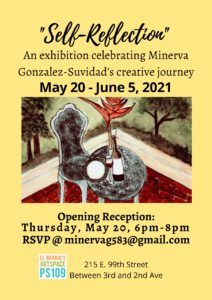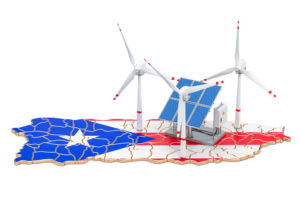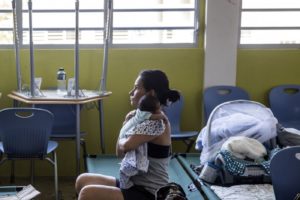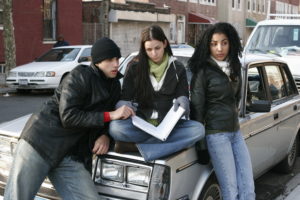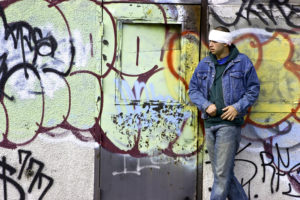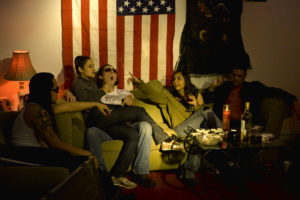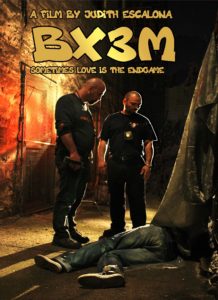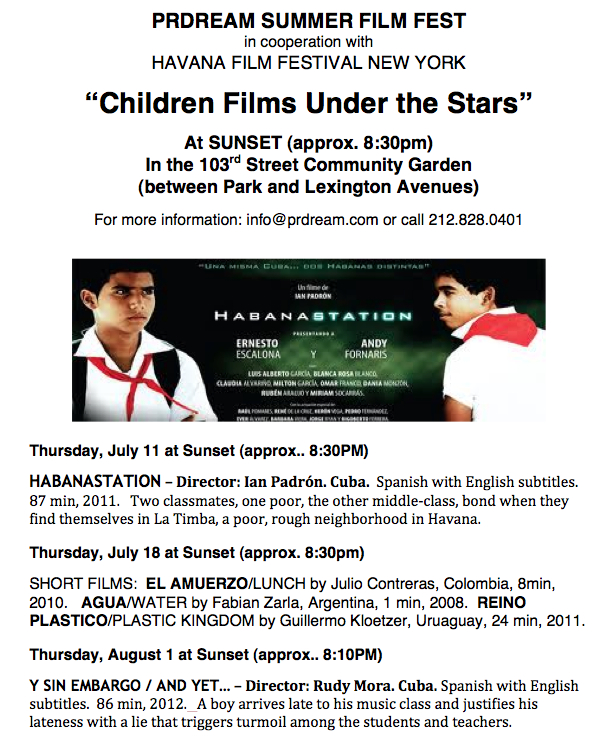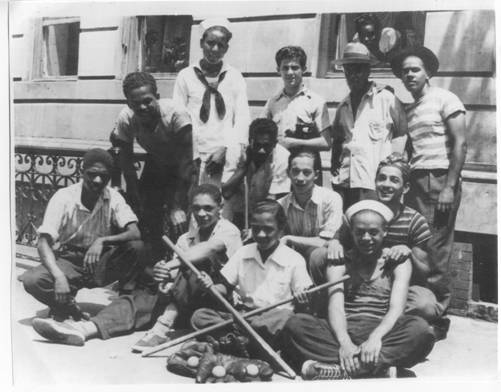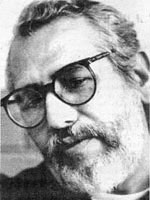Minerva Gonzalez-Suvidad takes the time to think about her artwork in a variety of media and invites you to join her in this introspective solo show.
All posts by escalona
This Hurricane Season, Puerto Ricans Are Imagining a Sustainable Future
Puerto Rican movements are rebuilding their island in a way that not only enhances climate resilience, but also reclaims their political power.
By , . Foreign Policy In Focus
Nine months after Hurricane Maria made landfall in Puerto Rico, the Caribbean island faces another potentially devastating hurricane season, while much of its infrastructure and land still remain in tatters.
The category-5 hurricane that ripped through the Caribbean last fall not only caused nearly 5,000 deaths, but also exposed the fragility of the island’s social, political, and economic underpinnings. The truth behind Maria’s devastation and the United States’ laggard response to the hurricane lies in centuries of colonial exploitation — first by Spain and then by the United States — and in its perpetual subjugation to the whims of American elite.
There is little that distinguishes Puerto Rico from an American colony. Since its acquisition of the island in 1898, the United States has gradually stripped Puerto Rico of any political agency through a web of legal cases, laws, and arbitrary categorizations intended to keep Puerto Rico politically weak and economically dependent on American products — and its poor, brown, “foreign” population distanced from their mainland compatriots.
Hurricane Maria exposed for the world to see what Puerto Ricans have known for centuries: that Washington treats Puerto Rico as little more than a captive market from which the U.S. extracts profits. Although Puerto Rico is an island bathed in sunlight and lashed by winds and waves, it imports 98 percent of its energy from American fossil fuel companies. And despite its fertile soil and lush tropical landscape, Puerto Rico buys around 90 percent of its food from U.S. agribusiness companies.
When Hurricane Maria hit Puerto Rico last September, it eviscerated fields of monocrops and shattered Puerto Rico’s already derelict electric grid. Many of the almost 5,000 deaths that resulted from Maria were due not to Maria’s whipping winds or flash flooding, but to the mass power outages and food shortages that ensued, a result of the government’s closing of hospitals and neglect of the electric grid necessitated by U.S.-imposed austerity measures.
Despite its catastrophic impacts, Hurricane Maria provides a kind of tabula rasa upon which a new, economically regenerative, and politically empowered Puerto Rico can be built. Several international and local organizations are already working in Puerto Rico to transition it away from an extractive and U.S.-dependent economy towards a self-sufficient, socially just, and ecologically sound one — while at the same time enhancing local economies, reclaiming sovereignty, and boosting climate resilience.
“When Puerto Rico experienced the effects of Maria,” says Angela Adrar of the Climate Justice Alliance, “it was clear that we had a one in a lifetime opportunity to unite communities together and have a vision for a just recovery.” That vision incorporates “food sovereignty, energy democracy, self-determination, and a real justice approach…to building power.” A just recovery for Puerto Rico not only means rebuilding what Maria destroyed, but reclaiming the political and economic agency stifled by American colonialism.
Resilient Power Puerto Rico, a grassroots relief effort that began hours after Maria hit the island, promotes energy democracy in post-Maria Puerto Rico by distributing solar-powered generators to remote parts of the island. The Just Transition Alliance, Climate Justice Alliance, and Greenpeace have also sent brigades to install solar panels across the island.
Solar energy reduces the carbon emissions that fueled Maria’s intensity and makes Puerto Rico more resilient against the next climate-charged storm. A decentralized renewable energy grid — which allows solar users to plug into or remain independent of the larger grid as necessary — combats Puerto Rico’s dependence on U.S. fossil fuels. It also democratizes Puerto Rico’s energy supply, placing power (literally and metaphorically) in the hands of Puerto Ricans rather than American fossil fuel corporations.
Another aspect of Puerto Rico’s “just recovery” is food sovereignty, a movement to promote community-controlled agricultural cooperatives that grow food for local consumption and thus counter Puerto Rico’s reliance on the American food industry.
The Organizatión Boricuá de Agricultura Ecológica encourages food sovereignty through “agroecology,” a method that revives local agriculture through traditional farming methods, rather than the monoculture system put in place by American colonists.
According to Corbin Laedlein of WhyHunger, who visited the Organizatión in 2016, “food sovereignty and agroecology are grounded in an analysis of how U.S. historic and structural settler colonialism and racism have shaped and continue to manifest in the food system today.”
By rejecting the larger food system and focusing on self-sufficiency, agroecology allows Puerto Ricans to reclaim the political and economy agency the U.S. denies them. The Organizatión sends brigades that deliver seeds for community members to plant. By stimulating local production, agroecology also reduces the carbon pollution emitted from ships transporting food to Puerto Rico, and moreover acts as a local carbon sink.
As the Atlantic Ocean incubates another hurricane season, the people of Puerto Rico are rebuilding their island in a way that not only enhances climate resilience, but also reclaims their political power. The island they are creating — one that is socially just, ecologically sustainable, and politically empowered — is an inspiring model for a just, sustainable future. One that is definitively not American-made.
Puerto Rico’s American Dream is dead
The traditional American dream is that the poorer parts of this country would, sooner or later, start catching up to the richer parts. The American South, after an extreme divergence, gained on the North after World War II. But Puerto Rico never made the same leap, and in relative terms has held roughly steady since 1970.
Worse yet, the island has about $123 billion in debt and pension obligations, compared with a gross domestic product of slightly more than $100 billion, a number that is sure to fall. In the last decade, the island has lost about 9 percent of its population, including many ambitious and talented individuals. In the past 20 years, Puerto Rico’s labor force shrank by about 20 percent, with the health-care sector being especially hard hit. The population of children under 5 has fallen 37 percent since 2000, and Puerto Rico has more of its population over 60 than any U.S. state.
Hurricane Maria has produced conditions unprecedented in recent American experience. Much of the island has no fresh water and no phone service, and the status of the food supply and its accessibility is uncertain. Restoring electricity will take months, the health-care system isn’t functioning, and a major dam may yet break, causing further dangerous flooding.
Those developments will worsen the already dire long-term prospects for Puerto Rico. Tourism no longer exists after the storm, and presumably outside investment will decline in both the short and longer run, due to damaged infrastructure and the possibility that major storms are now more likely as the climate changes.
Federal aid is being mobilized, but that won’t even restore the pre-storm state, which was already fiscally insolvent. Nydia Velazquez, a representative from New York, will be requesting a one-year waiver from the Jones Act, a federal law that requires cargo shipments to Puerto Rico take place on U.S. vehicles. The act was originally intended to help the U.S. shipping industry, but it raises prices in Puerto Rico by raising costs. A one-year waiver is better than nothing, but it’s sad we cannot repeal the Jones Act altogether, or at least permanently exempt Puerto Rico. It’s a sign of how little we are willing to budge to solve what is a catastrophic problem for 3.4 million Americans.
Statehood would have been Puerto Rico’s best chance for economic growth. One of the wisest features of American policy after the Revolution was the emphasis on rapid statehood, rather than territory status. When regions moved from territories to full-blown states, it provided a big boost to their per capita incomes. Puerto Rico never did the same, in part because its citizens voted not to, and in part because the mainland was reluctant to absorb a Hispanic territory. These days, political polarization renders statehood hard to imagine, as Puerto Rican senators likely would be Democrats.
Increasingly, it seems that many parts of the Western world might never “catch up,” including Greece, southern Italy, much of the Balkans and much of Latin America, in addition to Puerto Rico. One of the pleasing features of the 1990s, in retrospect a delusion, was the notion that proper policy and good multilateral institutions would bring most of the world into consistent, steady-state growth at a higher rate than what the wealthier countries could manage.
Sending external aid for life support is a fundamentally different endeavor than seeking to restore and then boost sustainable growth. Are we really ready to write off Puerto Rico? That this story hasn’t dominated the headlines unfortunately suggests the answer is yes. We’re looking at a future where Puerto Rico has simply ceased to be an independently viable economic unit.
In addition to the well-being of Puerto Ricans, at stake is what kind of nation the U.S. is going to be. Do we respond to major challenges, or run away from them? I expect to see American generosity toward Puerto Rico’s storm recovery, but unfortunately very little engagement with this more fundamental question.
BX3M, a film by Judith Escalona at the Havana Film Festival New York
BX3M, a film written anddirected by Judith Escalona, is in competition for the Havana Star Prize at the Havana Film Festival NY!
For Maria and Mona, graduation means fulfilling a dream. For Michael, it means dashing all hope of a better future. You either make the grade or you don’t— in academics or love— and that makes all the difference.
The film will screen Thursday, April 12 at 8:30PM––AMC Loews, West 34th Street, between 8th and 9th Avenues. See you there!
CLICK HERE TO BUY TICKETS: https://www.eventbrite.com/e/bx3m-tickets-44151114171
GREENMARKET on 99th Street and Madison Avenue
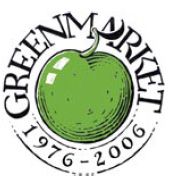
Buy fresh fruits and vegetables at your very own farmers’ market!
Mount Sinai has partnered with Greenmarket (a program of the Council on the Environment of New York City) to bring seasonal, healthy, nutritious produce grown regionally to the neighborhood.
On East 99th Street and Madison
Every Friday, July 14 – October 14, 8am to 4pm
The Greenmarket accepts WIC, Senior Nutrition Vouchers, and Foodstamps.
For more information call:
Community Relations at Mount Sinai 212-731-7888.
You are a Star!
Centro Gallery
Center for Puerto Rican Studies
At Hunter College
presents
You Are A Star
A Group Show
Manuel Acevedo — Luis Carle
Javier Cintron — David A. Cruz
Ricardo Hernandez — Yasmin Hernandez
Miguel Luciano — Wanda Ortiz
Rafael Rosario — Tufinyito
Rafael Velez
Curated by José Vidal
September 18–October 13, 2006
Reception on September 21, 2006
6:00-8:00 p.m.
The Gallery is open
Monday-Tuesday & Thursday 9:00 a.m. to 6:00 p.m.
Wednesday 9:00 a.m. to 8:00 p.m.
Friday & Saturday 12:00 p.m. to 5:00 p.m.
Centro is located on the third floor of the East Building
Hunter College at the corner of 68th Street and Lexington Avenue
PRDREAM presents BRAGGING RIGHTS
Sonia Gonzalez’ BRAGGING RIGHTS
THURSDAY, SEPTEMBER 7, 8:30PM
WHITE PARK
HANDBALL COURT WALL
106th Street
(between Lexington and Third Avenues)
BRAGGING RIGHTS is an hour-long video documentary that chronicles the vibrant history of the urban game of stickball through its colorful players.
Stickball has been played in the streets of New York City since the early 1920’s and is known as “the poor man’s baseball.” Stickball is the ultimate in improvising much with very little. Up until the 1960’s, hydrants, cars and sometimes old men sunning in chairs were bases. During that time, many ethnic communities that would fight each other any other day of the week, would compete on the stickball field on Sundays. Over time, racial barriers were broken and many of the players became lifelong friends.
Through the persistence and the passion of a tight-knit community brought together by tradition, the documentary chronicles what has become a national game of all family members. BRAGGING RIGHTS underscores the struggle to overcome and embrace difference and triumph over adversity.
BROADCAST PREMIERE:
Thursday, September 14th @ 8pm on PBS/Ch. 13
and re-aired Friday, September 15th @ 1am
For information: info@prdream.com
FILIBERTO: ENTREVISTA CLANDESTINA Screening

Screening and discussion
Saturday, September 9, 8PM
White Park
East 106th Street
between Lexington and Third Avenues
Filiberto: Entrevista Clandestina is an interview with Filiberto Ojeda Rios by Puerto Rican reporter Daisy Sanchez. The screening marks the first anniversary of his death at the hands of the FBI last year on September 23, a date that also commemorates El Grito de Lares.
The interview was conducted while he was in clandestine, after cutting off an electronic ankle shackle. Ojeda was on trial for his alleged involvement in the Macheteros’ Wells Fargo armored truck robbery in Hartford Connecticut. Filiberto speaks for himself and the Macheteros on the colonial issues confronting Puerto Rico.
The interview aired uncut on Puerto Rican television and was the most watched television program in the history of Puerto Rico. This film is an excerpted version of that television program.
If it rains, the screening will take place at PRdream / MediaNoche, across the street from White Park, 161 East 106th Street, First Floor.
Videoteca del Sur 17th Anniversary Celebration
Videoteca del Sur
1989 – 2006
17th ANNIVERSARY
presents
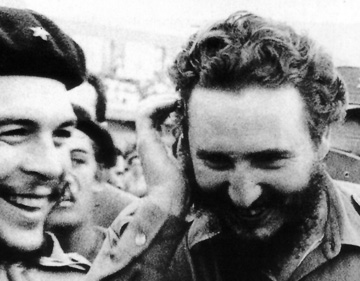
FIDEL
Dir.: Saul Landau CUBA – USA 96’
This documentary is a personal profile of Fidel Castro and a view of the developments since the revolution teen years before. There are a lot of images of Fidel: listening to complaints, arguing, laughing and philosophizing. As he is traveling the countryside in a jeep with the film crew, he is trying to explain the Cuban revolutionary experience. There is beautiful footage of the Bay of Pigs invasion, and of Fidel and Che Guevara in the mountains. Classical made in 1969 by outstanding author and filmmaker Saul Landau.
Documental que traza un retrato personal de Fidel Castro dando una mirada al desarrollo de los diez primeros años de la revolución cubana de 1959. Incluye abundante imágenes de Fidel: escuchando las peticiones de su pueblo, discutiendo, riendo y filosofando. Mientras viaja en un jeep a través del país Fidel trata de explicar la experiencia revolucionaria cubana al equipo de filmación que lo acompaña.
Clásico realizado en 1969 por el destacado documentalista estadounidense Saul Landau.
Tuesday, September 5 7:30pm
Millennium Film Workshop
66 East 4th Street
between Bowery & 2nd Ave., downtown Manhattan
Trains F to 2nd Ave. or #6 to Blecker St.
info: (212) 673-0090
next program / próximo programa:
September 12
